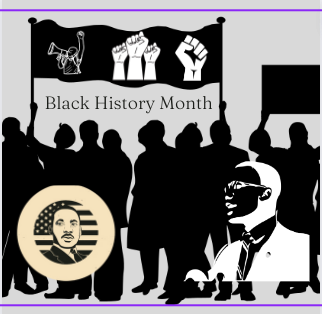Black leaders and their influence on Society

Black History Month is celebrated in the month of February. It honors the several Black leaders throughout history.
February 22, 2023
Black history month originated in 1915 when author and historian Carter G. Woodson founded an organization known as the Association for the Study of African American Life and History. Ever since Black History Month is celebrated from February 1 to March 1 to remember and honor important leaders and events in the history of the African Diaspora.
“I think Black History month is important because it’s [a] time… where we highlight the accomplishments,…achievements and the contributions of the Black [and] African American population to this country,” said English Teacher Danielle Hubbard.
Black leaders and their influences have not only been portrayed through news channels, television, and textbooks. In schools, specifically in US History classes, students continue to learn about the impact of these leaders by watching documentaries and doing research.
“So the most memorable moments [in class] usually deal with the Civil Rights Unit, in particular, teaching about Malcolm X. [These] seem to be things that draw a number of students into the content,” said US History teacher Bee Benson.
Learning about Black History and the various leaders who have contributed to society, has become a major component of US History classes. Especially, through presentations, research, projects, and discussions, students learn the foundations and roles of several Black leaders throughout American History.
“We [had] discussions regarding Black history…about how certain figures have played a role…and how it relates to the US. I think it’s really important to learn about this because they played a very big role in our past… and [they’ve] [helped] shape where we’ve come to now,” said Janvi Mehta (‘24)
Leaders such as Malcolm X, Martin Luther King Jr, Frederick Douglass, and more have been honored for their contributions to society. Other important Black leaders who have emerged more recently include those who have created an impact in today’s society, through the internet and media.
“I think it really depends on how one defines a Black leader…with the internet and social media it has really democratized the type of leadership we have so now it could be an [athlete and activist] like Colin Kaepernick or music[ian] whether its Public enemy or N.W.A. Everyone has the ability to have their voices reach a larger audience these days,” said Benson.
Black leaders today are those who have influenced today’s generation through their words, actions, professions, and accomplishments. From authors to actors, leaders continue to leave an impact on their communities.
“In my lifetime Spike Lee, Oprah Winfrey [and] Henry Louis Gates Jr would probably be the three quintessential that come to my mind. Henry Louis Gates Jr is an academic scholar and professor and he has written countless works on the African American experience. Oprah Winfrey [has a] breath of acknowledgment [and has earned] respect…because of her career and who she is as a human being. Spike Lee has been faithful to trying to uplift and depict accurately the African American Black culture,” said Hubbard.




